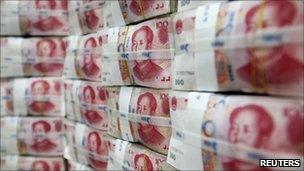US delays China 'currency manipulator' report
- Published

Countries including the US have accused China of keeping the yuan artificially low
The US government has delayed a report - which was expected on Friday - that could officially brand China a "currency manipulator".
The US Treasury releases two reports a year on the currency practices of its major trading partners.
It has so far held back from naming China. The report is not now expected until after an upcoming G20 summit.
China said the US should not use the weak yuan as a "scapegoat" for its own economic problems.
At a regular briefing, commerce ministry spokesman Yao Jian said China would continue to reform its currency policy, but at its own pace.
The last US treasury report, due in April, was eventually delayed for nearly three months and did not accuse China of manipulating its currency.
'Unreasonable' criticism
The US has not made the claim of currency manipulation since 1994, when China was named by the Bill Clinton administration.
Many analysts believe China is keeping the yuan artificially low in order to help its exporters compete in global markets.
Earlier this year China promised greater "flexibility" in its currency approach, but since then the yuan has only risen slightly in value.
Mr Yao said China would continue with currency reforms, but the speed of reform would be based on China's domestic economic situation.
He also rejected as "unreasonable" fresh criticism from the Japanese finance minister Yoshihiko Noda.
Mr Noda has joined calls for China to do more to allow the yuan to rise, and said the threat of currency wars was likely to be a significant issue at the upcoming G20 meeting.
But Mr Yao said Japan had "no reason, no grounds and [was] not qualified" to criticise China's currency policy.
Japan has currency worries of its own, with the Japanese yen currently hovering around 15-year highs against the dollar.
Five-year plan
Mr Noda has said the government is ready to take further "decisive steps" to curb further rises in the yen, after earlier interventions in the currency markets appeared to have little impact.
Earlier Japan's prime minister Naoto Kan also admitted he was "very concerned about the currency situation".
Growing criticism of China's currency policy comes as the country's Communist Party leaders meet to outline their next five-year economic plan.
The focus is likely to be on maintaining China's current rapid growth, which currently relies heavily on exports.
Officials will look at ways of boosting domestic demand from Chinese consumers in an effort to rebalance the economy.
- Published8 October 2010
- Published28 September 2010
- Published15 October 2010
- Published31 August 2010
- Published21 June 2010